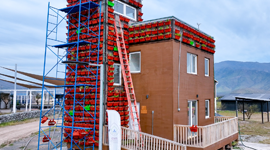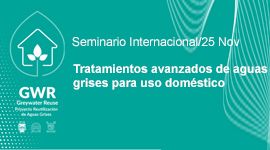You are here
World Water Day: Innovation and Reuse in the Face of the Water Crisis.

World Water Day on 22 March reminds us of the importance of this vital resource. However, given the current context of climate variability and increasingly frequent droughts, the need for action is more urgent than ever. Research into the treatment and reuse of grey water is emerging as a key alternative for ensuring water sustainability, reducing pressure on natural sources and promoting more efficient usage.
Greywater, from sources such as showers, sinks, and laundry, represents a water source that, with proper treatment, can be reused for various purposes. Using it not only reduces waste, but also lowers the demand for drinking water for non-essential purposes such as watering gardens, cleaning spaces, and flushing toilets.
In this context, the GWR greywater project (USACH, UNAB, U. Bío-Bío) has developed a testing platform to evaluate new technologies for treating and reusing this water. Combining these innovations with established systems can generate solutions adapted to different scenarios, providing clear guidelines for implementing greywater recovery strategies at the household level.
However, grey water reuse has the potential to benefit multiple productive sectors beyond domestic applications. One such industry is agriculture, where irrigation with treated water can reduce dependence on conventional water sources and support crop growth in arid or restricted areas. Grey water also has potential applications in construction, where it can be used for cement manufacturing, soil compaction, or cleaning equipment and work areas on building sites.
In the tourism sector, hotels and resorts can optimise their water consumption by using grey water treatment systems for garden irrigation, toilet flushing and cleaning facilities.
Another interesting application is in the textile industry, where the washing and dyeing of fabrics requires large volumes of water. Reusing treated water could therefore significantly reduce the industry's environmental impact.
Furthermore, as we observed in Brazil, incorporating these systems into large shopping centres and corporate buildings can reduce the consumption of drinking water in bathrooms, for maintenance purposes, and for air conditioning.
Despite the many possible applications of grey water treatment technologies for more sustainable water use, their widespread adoption still faces regulatory, economic and cultural challenges. It is crucial that governments develop clear regulations and incentives to encourage the installation of these systems in both new and existing buildings. Awareness-raising and education also play a key role in helping populations and businesses understand the benefits of safely and efficiently reusing water.
In a world where the water crisis is becoming increasingly evident, reusing grey water is not just an alternative; it is a necessity. Investing in innovation and integrating new technologies in this area will optimise water resources and pave the way towards a more sustainable and resilient future.
News
 A successful seminar was held on advanced gray water treatment and...
A successful seminar was held on advanced gray water treatment and...
 The international academic network will present its advances in gray...
The international academic network will present its advances in gray...
 The GWR Project attended the Chemical Engineering Congress.
The GWR Project attended the Chemical Engineering Congress.

